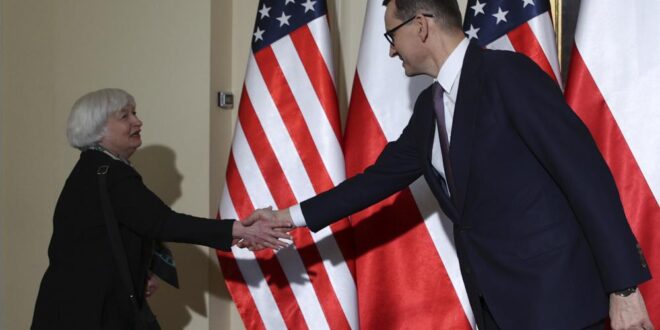U.S. Treasury Secretary Janet Yellen on Monday met with Ukrainian refugees and urged the need to confront Russian brutality as she visited Poland ahead of a meeting of finance ministers for the Group of Seven leading economies.
Yellen applauded Poland for helping refugees fleeing the fighting and working with neighboring countries to find ways to get Ukraine’s wheat and other critical food supplies to the world. She thanked them for responding to “rising food insecurity” exacerbated by the war.
“The devastation in Ukraine in the past months reminds us not to take our next meal for granted, and how quickly events can take a turn for the worse,” Yellen said at a visit to the World Central Kitchen site in Warsaw.
She met with refugees from Ukraine who are running the kitchen and said she will release an action plan later this week to address the global food crisis threatening parts of the developing world.
The conflict’s interruption to wheat, barley, sunflower oil and other staples that normally flow from Ukraine and Russia has further raised already high food prices worldwide. Countries in Africa, the Middle East and parts of Asia that rely on those affordable supplies face the risks of food insecurity and unrest.
Yellen also met with Prime Minister Mateusz Morawiecki to discuss tougher sanctions on Russia and strengthening NATO, which Sweden and Finland are now seeking to join.
“Poland is of an opinion that Russia should be made responsible for all damage incurred on Ukrainian territory,” Morawiecki’s office said in a statement.
Yellen also vowed to work with Poland on pressing forward with a global minimum tax of 15% on multinational corporations, which is meant to target tax havens, the Treasury Department said.
“This is our common denominator, that we have with the United States, meaning to put limits on the functioning of such places where business people run and don’t pay tax in the European Union or in other countries in the world,” Polish government spokesman Piotr Mueller said.
Poland has blocked the tax meant to deter global companies from stashing profits in countries where they pay little or no taxes. It got final approval from more than 130 countries at a meeting of the Group of 20 economies last October, but Polish officials have questioned if the tax will actually apply to online giants and insists it does.
Yellen also will stop in Brussels before attending the Group of Seven finance ministers’ summit in Bonn, Germany, this week.
In Warsaw, she spoke at the POLIN Museum of the History of Polish Jews at the site of the World War II-era Warsaw Ghetto, mentioning her father’s family left a town not far away for the United States.
“We must use the tools at our disposal to fight oppression. And that lesson must be applied today,” she said. Russian President Vladimir “Putin’s ongoing attacks on Ukraine require that we think about what we can do to confront brutality.”
She cited the sanctions that the U.S. and its partners have imposed, even as the European Union struggles to pass it’s sixth round of penalties. Landlocked countries heavily reliant on Russian oil haven’t signed on to a phaseout of the fuel.
In addressing food insecurity, Yellen said she will release an action plan this week by the International Financial Institution.
The U.S. Treasury said the details will focus on how the European Bank for Reconstruction and Development, World Bank and the other global financial institutions are “stepping up, surging, and scaling their work on food security and agriculture.”
World Bank President David Malpass said last month that his organization will provide $17 billion per year to strengthen food security worldwide.
The European Bank for Reconstruction and Development last week committed 1 billion euros this year for the Ukrainian economy, set to be a mix of donor funds and bank funding.
Looking to more funding sources, within U.S. President Joe Biden’s supplemental appropriations request for assistance to Ukraine, Treasury wants $500 million for the European Bank for Reconstruction and Development. That will include money for food security and $150 million for the Global Agriculture and Food Security Program, which channels funding to agricultural projects in impoverished countries.
 Eurasia Press & News
Eurasia Press & News




